
The Consumer Financial Protection Bureau on Tuesday hit Bank of America for charging multiple penalty fees to customers who didn't have enough money to cover a payment, as well as failing to deliver credit card rewards that it promised and opening a small number of accounts without customers' authorization.
The $3.2 trillion-asset bank was ordered to repay roughly $100 million in restitution to affected customers. It is also on the hook for a total of $150 million in fines to the CFPB and the Office of the Comptroller of the Currency.
The Charlotte, North Carolina, bank targeted consumers with special offers of cash and points for signing up for a rewards credit card, but then withheld the cash rewards or bonus points from tens of thousands of customers, the CFPB said.
In addition, Bank of America employees illegally applied for and opened a small number of credit card accounts without customers' knowledge or authorization dating back to at least 2012, long before the Wells Fargo fake-accounts scandal, according to the CFPB.
"Bank of America wrongfully withheld credit card rewards, double-dipped on fees, and opened accounts without consent," CFPB Director Rohit Chopra said in a
Chopra added: "The CFPB will be putting an end to these practices across the banking system."
Democratic Sen. Sherrod Brown, chairman of the Senate Banking Committee, seized upon the consent orders to criticize large banks.
"Bank of America has clearly broken the law in yet another case of Wall Street banks taking Americans' money to pad their already-massive profits," Brown said in a press release. "This is just the latest in a long line of illustrations of why we can't trust Wall Street to do the right thing. This kind of abuse is why we will continue to hold the big banks accountable, and it's why we need the CFPB — so consumers can keep their hard-earned money."
The OCC said that "in response to supervisory concerns," BofA has waived, refunded or agreed to refund tens of millions of dollars to customers who were harmed by the bank's practice of charging multiple overdraft and nonsufficient funds fees on a single transaction.
"Overdraft programs should help, not harm, consumers," Acting Comptroller of the Currency Michael J. Hsu said in a
The OCC said that when a bank receives a check or automated clearing house transaction for payment from an account that does not have sufficient funds available, the bank may decline to pay the transaction and charge a nonsufficient funds fee. But in some instances, third-party merchants resubmit checks or transactions for payment, resulting in multiple fees.
The consent orders show that BofA was under investigation at the time it reduced overdraft fees and eliminated nonsufficient funds fees last year.
In May 2022, BofA
"We voluntarily reduced overdraft fees and eliminated all nonsufficient fund fees in the first half of 2022," said Bill Halldin, a BofA spokesman. "As a result of these industry leading changes, revenue from these fees has dropped more than 90 percent."
The CFPB said that from September 2018 until February 2022, BofA "generated hundreds of millions of dollars from its practice of charging multiple [nonsufficient funds] fees on represented checks or ACH transactions. The CFPB said the bank "committed unfair acts and practices" when it charged several $35 fees on the same transaction.
The CFPB also said that BofA violated the Truth in Lending Act, the Fair Credit Reporting Act and the Consumer Financial Protection Act by withholding cash and points rewards to BofA customers who submitted applications either in-person or by phone. And BofA denied sign-up bonuses to customers due to failures of its business processes and systems, the consumer bureau said.
Also among the multiple violations, according to the CFPB: BofA used or obtained credit reports to consider consumers for new credit cards — even when the customer had not applied for or did not ask for the products.
Even when BofA's nationwide sales practices were facing governmental scrutiny, company executives were putting increased pressure on branch-based employees to sell more credit cards, according to a wrongful termination lawsuit filed by one of those ex-employees, interviews with other former employees and documents reviewed by
Even as the bank’s sales practices faced intense government scrutiny following the Wells Fargo scandal, senior leaders in Oregon were fostering a culture that valued credit-card sales above all else, according to several former employees.
The CFPB said in its consent order that "in response to sales pressure or to obtain incentive rewards," BofA "employees sometimes submitted applications for and issued credit cards without consumers' consent," though the agency noted that the practice "involved a small percentage" of new accounts.
The bureau said that because BofA illegally used or obtained consumers' credit reports, some customers were charged "unjustified fees, suffered negative effects to their credit profiles and had to spend time correcting errors."
The regulatory actions come on the heels of multiple past consent orders. Last year, BofA
Under the most recent orders, BofA is prohibited from charging repeat nonsufficient funds fees and will compensate customers for a total of $80.4 million in consumer redress. The bank also has agreed to stop opening unauthorized accounts, and to compensate consumers for any costs incurred from opening fake accounts. BofA also said it will disclose material limitations on any rewards cards bonuses, and provide bonuses as advertised. BofA has already paid roughly $23 million to customers who were denied rewards bonuses, the CFPB said.
The CFPB assessed a $90 million penalty, which includes $60 million for repeat nonsufficient fund charges and $30 million for both opening unauthorized accounts and the bank's credit card rewards practices. The fees will be deposited in the CFPB's civil money penalty fund.
The OCC assessed a separate $60 million civil money penalty, which the agency said BofA has paid to the Treasury Department.






